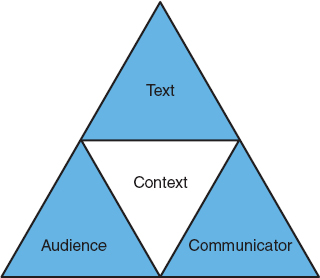2a Making good choices for your situation
Contents:
Looking at the big picture
Deciding to write
Considering informal and formal rhetorical situations
Seizing the opportune moment
Storyboards on rhetorical situations

A rhetorical situation is the full set of circumstances surrounding any communication. To communicate effectively, you need to make careful choices about all of the elements of your situation. The rhetorical situation is often depicted as a triangle to present the idea that three important elements are closely connected—
 Looking at the big picture
Looking at the big picture
As the triangle suggests, you’ll benefit from thinking about audience, topic, and purpose together—
 Deciding to write
Deciding to write
Because elements of the rhetorical situation are such important considerations in effective writing, you should start thinking about them at an early stage, as soon as you make the decision to write. In a general sense, of course, this decision is often made for you when employers and instructors set deadlines and due dates. But even in such situations, consciously deciding to write is important. Experienced writers report that making up their minds to begin a writing task represents a big step toward getting the job done.
 Considering informal and formal rhetorical situations
Considering informal and formal rhetorical situations
You may well be accustomed to writing in some rhetorical situations that you don’t analyze closely. When you post something on a friend’s Facebook page, for example, you probably spend little time pondering what your friend values or finds amusing, how to phrase your words, which links or photos would best emphasize your point, or why you’re taking the time to post.
However, academic and other formal rhetorical situations may seem considerably less familiar than the social writing you share with friends. Until you understand clearly what such situations demand of you, you should allow additional time to analyze the topic, purpose, audience, and other elements of your context with care.
 Seizing the opportune moment
Seizing the opportune moment
In ancient Greece, Kairos (youngest son of Zeus), the god of opportunity, was depicted as running, with a prominent lock of hair on his forehead but a bald head in back. Seizing the opportune moment meant grabbing the hair as Kairos approached; once he passed, the opportune moment was gone. Considering rhetorical situations means thinking hard about kairos, the appropriate time and the most opportune ways to get your point across. Just as you understand that re-